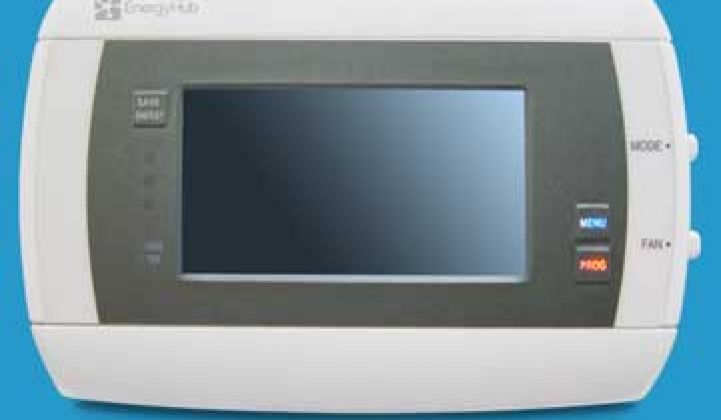EnergyHub added another dimension to its home energy management offerings on Monday with Mercury, a new software-as-a-service platform.
The new product is an evolution from the Brooklyn-based company’s dashboard and software offerings. It is a white label service that is being offered to television and cable providers, home security companies and utilities that can ride on top of any wireless thermostat.
As the price of wireless thermostats drops (you can buy them for as cheap as $100 at Home Depot and utilities often give them away to entice customers into demand response programs), there is a growing need for sophisticated software to go along with the devices, said Seth Frader-Thompson, CEO of EnergyHub.
For utilities, the platform will help homeowners enroll and stick with demand response programs. Not only will it provide two-way visibility, it will also allow customers to easily see how long a demand response event is going to last, or if they need to, to override the event. A service like this would have come in handy during the recent heat wave when Baltimore Gas & Electric was flooded with angry phone calls when customers in the PeakSavers program had their air conditioning shut off during the hottest hours of the day.
Not only will Mercury allow people to optimize their energy settings on a smart thermostat, it will also offer feedback based on the household’s usage and comparison to neighbors. EnergyHub says its system can save up to 20 percent on home energy bills. Mobile apps and websites to go with the service will also be white labeled.
For cable and telco providers, it’s just another opportunity to layer monthly services on top of a bill. Ditto for energy security companies, which are already dabbling in energy management. Frader-Thompson said the first partnership would be publicly announced soon and that their distribution “will get us to hundreds of thousands of customers in the near term.”
Software analytics for energy management is heating up, to make devices smarter and more automated. EnergyHub is not ditching its dashboard but rather is taking another approach: “This is a different business side for us,” said Frader-Thompson. “They’re two complementary offerings. One is more entry-level and one is a deeper intervention.”
EcoFactor is one company that is already in the market with analytics that control a smart thermostat using everything from weather data to historical usage -- all within a customer’s preset comfort levels. People Power is also going straight to manufacturers instead of consumers, although it is focusing on appliances, office equipment, set-top boxes and other consumer electronics, and not just controlling home HVAC.
EnergyHub says that its advantage is the scale of distribution given its initial partnerships. EnergyHub is acknowledging that the path to energy efficiency is still evolving, hence its multi-channel, multi-pronged approach. “There are layers and layers to the puzzle. The first step is you need people to adopt a basic level of efficiency,” said Frader-Thompson. “Then it’s a matter of, how do you keep people on the wagon?” EnergyHub is betting that Mercury is one answer to that question.



